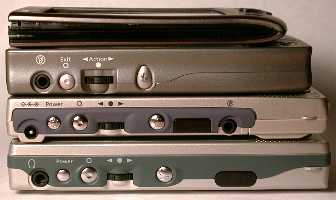 (E-100 is on the bottom)
(E-100 is on the bottom)| Official Gadgeteer Hands On
Review: Casio E-100 by Julie Strietelmeier Last date revised: 05/23/99 |
Program Requirements:
Desktop:
Windows 98/95 or NT 4.0
486/66DX or higher processor (Pentium 90 recommended)
16 MB of memory for Win98/95, 32 MB for WinNT
Windows 98/955 or NT 4.0 (NT 4.0 users require Service Pack 3)
10-50 MB of hard disk space
Free serial port
CD-ROM
The much anticipated Casio E-100 color Palm-size PC is finally here. Casio who have really been the leader in the WindowsCE Palm-size PC arena, have produced more models than the other manufacturers so far. First there was the E-10, then the E-11, recently the E-15, now the E-100 and soon the E-105 (more about the E-105 later). Wow, they sure have been busy. But, of all their models to date, the E-100 is the one which I believe will changes the future of the Palm-size PC.
Hardware Specs:
Operating system:
Windows CE ver 2.11
Desktop Software:
Windows CE Services ver 2.2
Processor:
MIPS VR4121 processor operating at 131 MHz
Memory:
16MB RAM, 16MB ROM
Display:
240 � 320 pixel Color LCD, HAST (Hyper Amorphous Silicon TFT), 65,536 Colors
One CompactFlash slot Type I/II slot (3.3v)
IrDA ver 1.0 port
Earphone Jack:
Stereo
Power:
Lithium Ion Rechargeable battery pack
AC adapter also included (Input: AC100-120V 50/60Hz 29VA, Output: DC5V 2A)
Back-up Lithium CR2032 battery
Size & Weight:
5 1/8" x 3 1/4" x 3/4"
9.0 oz.
The case styling on the E-100 is almost identical to the E-15. The only major differences are that the E-100 is about 1/8" inch longer and thicker than the E-15. The E-100 is also heavier. The case itself is a light grey/silvery plastic. The sides of the case have purple colored rubberized grips which help you hold on to the unit. The case is solid and feels well made. After using a Palm V for several months, the E-100 seems big but having used it for 3 days I've gotten used to it. You can see the pictures below comparing the size of the E-100 with that of an E-11, E-15 and a Palm V.
 (E-100 is on the bottom)
(E-100 is on the bottom)
The front of the case has same new cursor control button that the E-15 introduced. This is a round button that is similar to the gamepad on a Nintendo Gameboy. It can be easily pressed in 4 different directions. Up, down, left or right. This button helps you use the E-100 with just one hand. I think it is easier to use than the Action/Rocker button for scrolling up and down through data. I just wish this button could be used to select things by pressing the center in. Mainly I think this button will be popular for games. I have been helping to beta test PalmGB which is a Gameboy emulator for the PSPC. Playing Gameboy games on the E-100 is really alot of fun.
The front of the case also has 3 launch buttons. These buttons will power the unit on and launch the designated application. The top button will launch the built in menu program. The other two buttons will launch the datebook and contacts apps. You can also configure these three buttons to launch different apps if you desire.
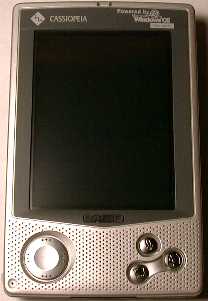 |
Between the cursor and application buttons is the speaker. I really like
having the speaker on the front of the unit because sounds are louder and don't become
muffled by your hand as they do when the speaker is on the back of the unit. The volume
level on the E-100 is loud and clear. I think it is about the same loudness as an E-15,
but the E-100 has a fuller sound to it which is more pleasing to the ear. At the bottom
left of the unit near the cursor button is the microphone. The location of the microphone
is kind of strange, but it does pick up sound very well anyway. On the top front of the E-100 are two LEDs. One is the battery charger LED that glows green when the unit is charging and turns off when the batteries are fully charged. I personally wouldn't have picked green as the charging color though because to me that means go, ok or good like the batteries are already changed. I would have picked maybe yellow or amber... oh well, they didn't ask me. The other LED blinks red when an alarm goes off. You can also set alarms so that this LED is your only notification of an alarm. This is a nice feature for meetings where you don't want an actual loud alarm sound to go off but still want notification them. |
On the bottom of the E-100 is the serial port. On the E-15 there was a little sliding door that you could pull over the port when you didn't want to sync. The E-100 has a similar feature. This is a nice touch that I really like although half the time I forget to close it. Beside the serial port is the AC adapter connector. With the included AC adapter, you can plug it in and use the E-100 without draining the internal batteries. Unlike the E-15, plugging in the AC adapter will also recharge the batteries. If you are upgrading from the E-15, you can use the same AC adapter (p/n: AD-C50200U) with the E-100. That way, you could take your spare adapter to work with you and leave it there.

The left side of the PDA has all the buttons. There are four buttons, one connector and one IR port. At the top is a standard sized earphone jack (stereo). Below that is the Power button. This is a pretty small button that I find somewhat hard to press. To do so, I have to use the tip of my thumb or thumbnail. Fortunately, I usually just turn the unit on by pressing the menu launcher button on the front. Below the Power button is the Exit button. This button will exit out of selections or menus. Next comes the Action Rocker/Selection button. This button can be pressed in to select an option or menu selection, it can also be rocked up or down to cycle through selections. The front cursor pad will do this also. Comparing the Action button on the E-100 with the same button on the E-15, I found that the E-100's button is just a bit easier to use because it sticks out a tiny bit more. Below the Action button is the Voice Recorder button. Pressing and holding this button will turn the unit on and start recording a voice note. Next in line is the IR port. Like the E-15, the E-100 also has the IR port on the side of the unit instead of the top. I rarely use my IR port, but if I did, I could see why this location would be a problem. I think your fingers (left handers) or palm (right handers) would get in the way of the beam. One thing I want to mention is that the Exit and Voice Recorder buttons are actually set at a slight angle and are recessed so that they can't accidentally be activated. All but the Action button have tactile feedback (clicks) when pressing them in.

The right side of the E-100 is bare except for the rubberized grip and stylus holder. The stylus is exactly like the E-10/11 stylus except that it is a different color and has a green tip. I like the stylus holder on this unit better than the E-15 because it is easier to remove the stylus just by sliding your thumb over it. Writing with the stylus is ok but for such a nice PDA, I would have really liked to have seen a metal stylus... but that is what 3rd party accessories are for I suppose.

On the back of the E-100 is the compact flash slot. This slot is covered with a door. Like the E-15, this is really the only fragile part of the PDA that I have noticed. The door is held in place on each side by little plastic nubs. If you weren't careful, I think it would be easy to break the little nubs off. I really prefer a compact flash slot like the one on the Compaq Aero. It just has an opening that is either filled with a card or plastic slug in the shape of a real card. Beside the compact flash slot is a card lock slider switch that is supposed to hold the card in the slot when it is locked. This switch doesn't work for regular CF cards but I'm guessing it is there for forthcoming accessories that might require you to leave off the slot door.
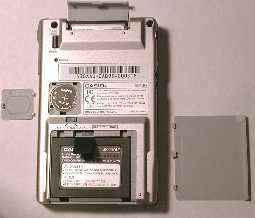
The back of the unit also has the reset switch that can be activated by the tip of the stylus.
The battery compartments are also on the back of the unit. A unique slider switch locks or unlocks the main and backup battery doors so that you can easily remove them. Behind the big door is the main battery. The E-100 is rated for 8 hours of battery life (depending on use) and comes with a rechargeable lithium ion battery pack which charges while the E-100 is in the cradle or plugged directly into the AC adapter. Unlike the E-15, you can't substitute regular alkaline batteries in a pinch. Behind the smaller door is the backup battery which is the standard CR2032 coin cell. During my review period, I never had a low battery warning and was able to play movies, and mp3 songs off my 32meg CF card off and on all day. I'm guessing that I could probably get 2-3 days of typical use out of one charge. But, to be safe I just put the E-100 on the charger once a day.
Now let's talk about one of the best features on the E-100. The LCD display on the E-100 is capable of displaying 65,536 colors. Of the different color PSPCs that I've reviewed so far, the display on the E-100 is really far superior. It is bright and crisp and the colors are terrific. Being able to display all those colors really makes the screen look as good as your regular computer monitor. Usually when you see magazine ads with Palm-size PC screen shots, you don't get a fair representation of what the display looks like in real life. Well, let me tell you that ads for the E-100 do look like the screen in real life. After using this unit, even my Palm V's display looks inferior. The display is just so easy to read. It is very easy on the eyes which I appreciate. But, (there's always a 'but') the E-100 does not do well outdoors. Even on an overcast day, it was hard to read the display. The screen shots below give you an vague idea of what this screen is like.
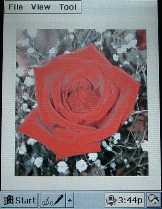

As far writing with a stylus on the screen, the screen has a slight paper-like feel to it. It is more smooth than the Casio E-15, but not as smooth as the E-10/11 screen. The E-100s screen is sensitive and easy to write on. I didn't have any problems at all with Jot or drawing on the screen.
Sound quality through the earphones on the E-100 is excellent. I did a test where I put some .mp3 songs on a CompactFlash card and listened to them using Hum (an mp3 player for Windows CE) on both the E-100 and E-15 and through my PCs CD player with earphones. I found that the E-100 was louder (at the highest volume setting) than the E-15. Although the E-15 is not stereo, it still sounds pretty good to me. The E-100 on the other hand has a stereo earphone jack. Listening to the same songs was a very different experience. I won't say that I'm an audiophile, but I think I have a pretty sensitive ear and if you enjoy listening to music, you will want the E-100. I also noticed that while using earphones that I didn't need to turn the volume very high because it is loud! Comparing a track (.mp3) playing with HUM on the E-100 and directly from the CD on my PC, I found that the two were quite similar. Playing the song right from the CD was better of course but mainly the differences were that the E-100 doesn't have quite as much bass and the tones are warmer on the CD.
The built in speaker on the E-100 is also quite good. It is loud and clear. I read in the newsgroups where one person complained about the audio having cracking and popping. I didn't have those problems at all. I'm very happy with the sound out of the speaker.
For voice recordings, the E-100 does a great job. You can chose from 4 different formats Mobile Voice, PCM, TrueSpeech or IMA ADPCM. They all sound very clear with minimal background hissing and no crackling or popping that I noticed. If you want to use the E-100 as a voice recorder, I think you'll be very happy with it.
As for memory, the E-100 has 16 MB of RAM and 16 MB of ROM. Available soon will be the E-105 which has 32 MB of RAM. The memory (RAM) on the E-100 can not be upgraded to the level of the E-105. I was reading somewhere on the newsgroups that with the 32 MB model that you could only use up to 16 MB for storage memory and that the other 16 MB would have to be used for program memory. I'm not sure if this is true or not. I'll update this review when I find out for sure. The ROM on the E-100 can be upgraded for the next version of Windows CE (Rapier).
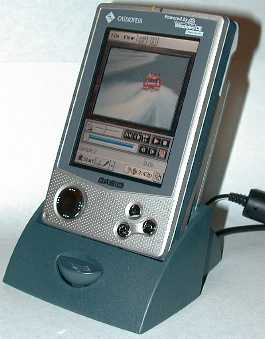 |
What about the overall system speed of the unit? The E-100 is the fastest
Palm-size PC unit yet. It completely blows the others out of the water. Running at 131 MHz
the E-100 finally makes Windows CE fun. Navigating around the menus was fast and painless.
Programs seemed for the most part to open in an instant even when I had multiple programs
running at once. I also didn't find any lags with running programs off of a CF card. Due
to the overall speed, using the E-100 is a real blast. The only complaint I have
with the system speed is with closing programs. I don't think I can really fault the
E-100 though as it is really the fault of Windows CE. Closing individual programs
takes about 5 seconds which I don't think is acceptable. Ok, I know the next question will
be.. is the E-100 as fast as the Palm V? I will say that in a race, the Palm V will win as
far as overall system speed, but not by much. The E-100 is that fast. The E-100 cradle is almost identical to the E-15 cradle. With the only real difference being that there isn't a battery charging indicator LED on the front of the cradle and the connector that the E-100 mates with is in the middle of the cradle instead of off to one side. The E-100 slides into the cradle pretty easily as long as you line up the little ears on each side of the PDA with grooves in the cradle. Removing the PDA requires you to press the eject button and then lift out the unit. I wish the cradle was heavier than it is so that it wouldn't slide around as much when trying to get the E-100 out. But that really isn't that big of a problem I guess. |
The E-100 comes with the same type of slip case that the E-10/11/15 have. This one is a lighter grey and feels more rubbery though.
Software Specs:
The Casio E-100 comes with WindowsCE Services 2.2 and not much else. In the past Casio has included a nice software bundle with their PDAs. Unfortunately, that isn't the case with the E-100. There will be an optional multimedia software pack available soon that you can buy for $69. I think Casio made a big mistake here. They should have included this bundle with the E-100 instead of making people buy it later. I don't know what Casio was thinking when they created the hottest multimedia PDA ever and then didn't include ANY multimedia applications with it. I think people want the goodies included so they can start playing with their new toy as soon as possible. One thing that will irritate potential buyers is that the box that the E-100 comes in shows screen shots of the movie player, MS audio player, and Expedia Pocket Streets 98. People might not see the word 'optional' near these pictures and think that this software is included in the box.
The actual included programs that are already installed into the ROM of the E-100 are:
Card Backup Tool - Card Backup Tool lets you quickly and easily backup your CASSIOPEIA E-100's memory data to a memory card. Backed up data let's you easily restore your system should it start to malfunction due to a possible data error. Loaded in ROM.Menu - Menu is an application launcher that runs on the CASSIOPEIA. It lets you assign application and files up to twelve button on its main menu, from which you can launch an application or open a file with a tap of the stylus. Menu also lets you assign sub-menus to a main menu button. Tapping such a button opens a sub-menu that has six buttons to which you can assign applications and files to make your CASSIOPEIA operations more organized and efficient. Loaded in ROM.
E-100 owners can go to the Casio E-100 page and download some free software. You'll need your serial # in order to do this:
Enterprise Harmony '99 from Extended Systems - Synchronize your data with Mircosoft Outlook or Palm Desktop. Enterprise Harmony 99, from Extended Systems, is a powerful way to keep your contacts, schedule, and e-mail up-todate on your new CASSIOPEIA. You can use the software to synchronize Pocket Outlook on your E-100 with Mircosoft Outlook on your desktop. And if your primary personal manager is Palm Computing's Palm Desktop application, Enterprise Harmony 99 can help as well. Requires installation. I wasn't able to get this software to work with my Palm Desktop. It wanted me to have Outlook 98 installed which I don't use.
Avantgo - Offline web browser.
Audible - Audio content player. This software will let you download audio books, radio programs, and audio magazines for playback on your E-100. This is a really cool piece of software that I helped to beta test.
The optional ($69) Multimedia Software Pack will include:
CIS Image Viewer - Image viewer that can view .jpg, .bmp, .cam files (Casio QV digital camera files), and special Windows CE format image files. It is a pretty basic viewer. I wish it could view .gif files and had some extra features like thumbnail views, and rotation.
Movie Converter - Windows application that allows you to convert AVI, QuickTime and MPEG1 movie files into a format that the Movie Player can view.
Movie Player - Player that can play movies converted to the correct format using the Movie Converter software. You can change the background picture, and control the playback speed. You can also save a single frame as a .jpg file. The movies can have audio included and there is an easy to use slider to change the volume control. The program installs with 2 small sample movies. One is of a swimming fish and the other is a speed boat. This is a neat program and made one of my friends at work say "No way!" when he saw it.
Mobile Audio Player - Will play MS Audio files. I'm not sure how these files will differ from .mp3 files... I'm wondering if the software will include some type of converter so that you can convert your current .mp3 files to this format. The Multimedia disk that came with my review unit did not have the Mobile Audio Player on it.
PalmGolf - 1-4 player color golf game that is a lot of fun.
Overall Summary:
I'm very happy with the Casio E-100. First of all I like the case style and think it looks sleek and professional. I can live with the size and weight when I consider all the cool stuff that it does. Not that I wouldn't love this same machine in a little bit smaller package... As far as the hardware, the only thing that I can nit-pick about is the compact flash slot door. I wish it were easier to open or even better, wasn't there at all. I love the color display. No squinting needed and works great in any indoor lighting conditions. System speed is great as well. It makes Windows CE much easier to use. Overall, I really really like this machine. I've been a PalmPilot user exclusively since the days of the PalmPilot 1000. I'm now going to transfer all my data off my Palm V and use the E-100 as my main PDA. I'm going to give this a try for a month to see how well I can get along with Windows CE as compared to the Palm OS.
If you are looking to buy a color PSPC, this is definately the one to buy. The only reason why I would not buy the Casio E-100 is if you were going to be using the unit exclusively outdoors. Then the Compaq Aero is the better choice due to its reflective display.
Price: $499
Pros:
131 MHz processor is FAST!
Over 65,000 colors display
Rechargeable batteries
Stereo earphone jack
Cursor pad
Cons:
Doesn't come with any multimedia software at all. There is an optional CD
that you can buy for $69
CompactFlash slot door seems a bit fragile
Strange microphone and IR port locations
| Let me know your comments on the Casio
E-100 PSPC and read what others have to say. |